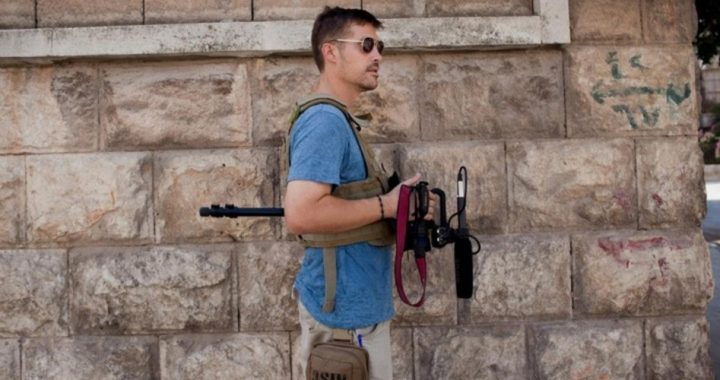
In the aftermath of the publicized execution of James Foley by Islamic thugs in the Middle East, a picture is emerging of a man who was sustained throughout his adult life by a deep faith in God.
In a statement to reporters after the release of a video supposedly showing Foley’s beheading by a black-robed and masked executioner with a British accent, the journalist’s father, John, said with deep emotion that “we know Jimmy is free. He’s finally free. And we know he’s in God’s hands … and we know he’s in heaven.”
Breitbart News noted that Jim Foley attended Marquette University, a prestigious Jesuit Catholic school in Milwaukee, Wisconsin, and following nearly two months of captivity in Libya in 2011, Foley “penned a letter to Marquette to explain why the university was always a friend to him, but specifically in captivity.”
In the letter, republished in Marquette magazine, Foley recalled that as a student at the university in the early 1990s he did volunteer work in South Dakota and Mississippi, where he learned that “I was a sheltered kid and the world had real problems. I came to know young people who wanted to give their hearts for others.”
Later, he recalled, “I volunteered in a Milwaukee junior high school up the street from the university and was inspired to become an inner-city teacher. But Marquette was perhaps never a bigger friend to me than when I was imprisoned as a journalist.”
During that first captivity, wrote Foley, he and two fellow journalists were held in a jail in Tripoli, where he began to turn to his Catholic faith for comfort and courage. “I began to pray the rosary,” Foley recalled. “It was what my mother and grandmother would have prayed.”
He noted that the 10 “Hail Marys,” recited between each “Our Father,” took “a long time, almost an hour to count 100 Hail Marys off on my knuckles. And it helped to keep my mind focused.”
He and another imprisoned journalist he identified as Clare sometimes prayed aloud together. “It felt energizing to speak our weaknesses and hopes together,” he wrote, “as if in a conversation with God, rather than silently and alone.”
Later, wrote Foley, after his captors allowed him to call home and his mother, Diane, assured him of the prayer of his family and friends, “I replayed that call hundreds of times in my head — my mother’s voice, the names of my friends, her knowledge of our situation, her absolute belief in the power of prayer. She told me my friends had gathered to do anything they could to help. I knew I wasn’t alone.”
Following her son’s murder, Diane Foley posted a message on Facebook saying that she and her husband had “never been prouder of our son Jim. He gave his life trying to expose the world to the suffering of the Syrian people…. We thank Jim for all the joy he gave us. He was an extraordinary son, brother, journalist and person.”
In comments to reporters Mrs. Foley noted that “so many people were praying for Jim. And I really think that’s what gave Jim an unusual courage. Jim just could feel the prayers. He was strong, courageous, loving to the end … he was just a hero.”
On Sunday, August 24, residents of Foley’s hometown of Rochester, New Hampshire, came together for a special mass to honor their late native son. “This moment in our lives is international in scope, crossing all boundaries, yet very personal,” said Bishop Peter Libasci of the Manchester diocese during the memorial service at Our Lady of the Holy Rosary. He said that Foley had gone to Syria “so that we might open our eyes.”
Also on August 24, Foley’s parents released a final message their son smuggled out to them through a freed fellow prisoner. The Washington Post reported that the message to the Foley family was memorized and repeated back to them by Danish photojournalist Daniel Rye Ottosen, who spent more than a year imprisoned with Foley before being released by the ISIS criminals.
“Dear Family and Friends,” wrote Foley in his final letter, “I remember going to the Mall with Dad, a very long bike ride with Mom. I remember so many great family times that take me away from this prison. Dreams of family and friends take me away and happiness fills my heart.”
Foley wrote that “I know you are thinking of me and praying for me. And I am so thankful. I feel you all especially when I pray. I pray for you to stay strong and to believe. I really feel I can touch you even in this darkness when I pray.”
He told of being held with 17 other prisoners in one cell, where they had “endless long conversations about movies, trivia, sports. We have played games made up of scraps found in our cell … we have found ways to play checkers, Chess, and Risk … and have had tournaments of competition, spending some days preparing strategies for the next day’s game or lecture. The games and teaching each other have helped the time pass. They have been a huge help. We repeat stories and laugh to break the tension.”
Foley recalled “playing Werewolf in the dark with Michael and so many other adventures. I think of chasing Mattie and T around the kitchen counter.” He also directed that if “there is any money left in my bank account, I want it to go to Michael and Matthew. I am so proud of you, Michael and thankful to you for happy childhood memories and to you and Kristie for happy adult ones.”
After recounting other memories of family and loved ones, Foley ended the letter with hope of being reunited with those he loved. “Stay strong,” he wrote, “because I am going to need your help to reclaim my life.”
Photo of James Foley from Facebook



